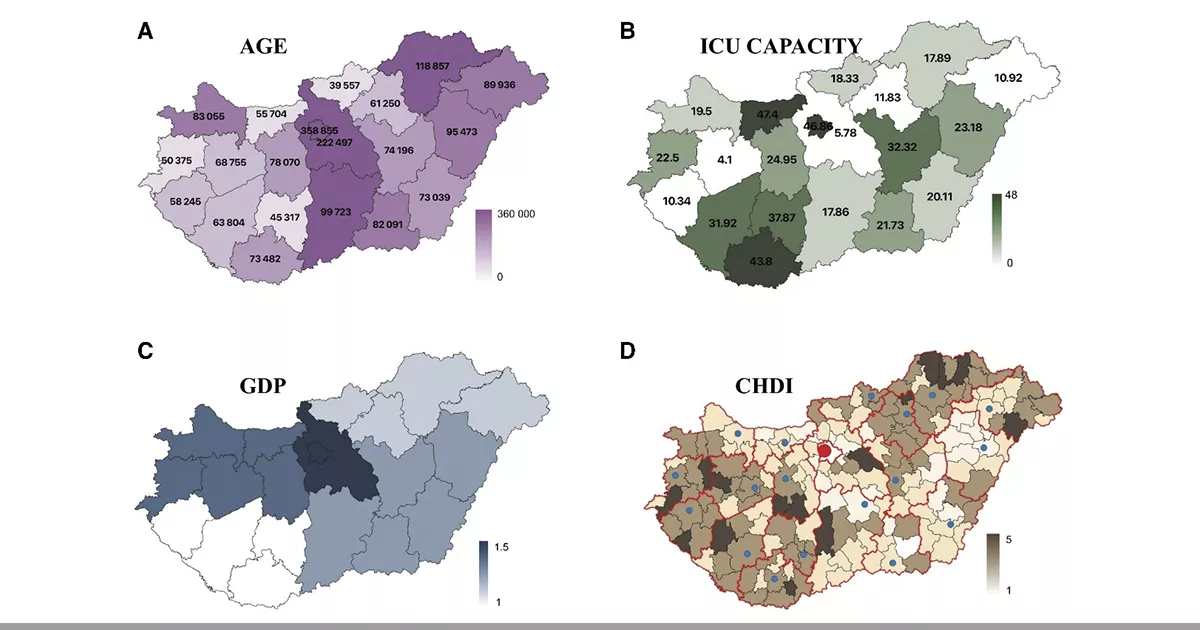As a part of an interdisciplinary research group, Sándor Zsolt Kovács (junior research fellow, ELKH KRTK RKI) and Annamária Uzzoli (senior research fellow, ELKH KRTK RKI) have been co-authors of a recently published article „Translating Scientific Knowledge to Government Decision Makers Has Crucial Importance in the Management of the COVID-19 Pandemic” which came out in the prestigious journal Population Health Management. The study deals with the course of the first wave of the coronavirus (COVID-19) pandemic in Hungary, in which the authors modelled the effects of the epidemic on the health care system, the economy and regional differences.
The members of the interdisciplinary research group („Translational Action and Research Group against Coronavirus” – acronym: KETLAK) have applied methodologies of different scientific fields (medical science, mathematics, economics, geography and regional science) and included the first results about the Coronavirus pandemics. During March and April 2020, the KETLAK group elaborated two comprehensive research report in which they have identified different problem fields and suggested opportunities for solving them. The introduced models within this article estimated the source and capacities of healthcare, the impacts of “re-opening”. These models have also pointed out on the optimal testing and tracking strategies by different spreading scenarios of the virus. Based on these results, the alternatives of a national testing and screening programme has been determined during the first wave of the pandemics in Hungary.
The research results provided crucial background sources for the Hungarian Government to make strategic decisions about the allocation of healthcare capacities, maintaining the lock-down, as well as the actual testing strategy. These research results supported the decision-makers to take the regional, social, and healthcare differences into consideration (Figure 1).

Reviewing regional differences, map “A” shows the population over 65 years old. Map “B” demonstrates the capacity of intensive care units (ICU) with the number of available ICU beds calculated for 100,000 people. The map “C” illustrates the estimated GDP loss related to the impact of pandemics. The values are normalized and then scaled between 1 and 1.5 to illustrate the differences among the Hungarian regions. The map “D” shows the results of the recently calculated “Complex Health Distance Index” (CHDI). The values of the index have been calculated on a scale from 1 to 5. The higher values of this indicator represent poor health conditions of the local population and barriers in access to health care, while districts with lower values (mostly county seats and Budapest) have the best health conditions and access to health care institutions with outpatient care.
Hungary managed the first part of the COVID-19 pandemic with low infection rate in a European comparison. It also confirms that the formation of multidisciplinary research groups is essential for policy makers in times of epidemics. The establishment, research activity, and participation in decision-making of these groups, such as KETLAK, can serve as a model for other countries, researchers, and policy makers not only in managing the challenges of COVID-19, but in future pandemics as well.
The full text of the article is available here: https://www.liebertpub.com/doi/full/10.1089/pop.2020.0159
The members of the KETLAK research group: Katalin Gombos (University of Pécs), Róbert Herczeg (University of Pécs), Bálint Erőss (University of Pécs), Sándor Zsolt Kovács (ELKH KRTK RKI), Annamária Uzzoli (ELKH KRTK RKI), Tamás Nagy (University of Pécs), Szabolcs Kiss (University of Pécs and University of Szeged), Zsolt Szakács (University of Pécs), Marcell Imrei (University of Pécs), Andrea Szentesi (University of Pécs and University of Szeged), Anikó Nagy (Heim Pál National Pediatric Institute), Attila Fábián (University of Sopron), Péter Hegyi (University of Pécs and University of Szeged) and Attila Gyenesei (University of Pécs and University of Bialystok).